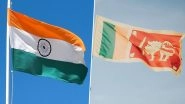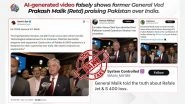Istanbul, Oct 12 (AFP) Turkey and the United States on Thursday ratcheted up the pressure on Saudi Arabia to explain how a journalist vanished after entering its Istanbul consulate last week, with US lawmakers warning that military ties were at risk.
President Donald Trump became more forceful in his call for answers from Saudi Arabia but he also rebuffed calls from the US Congress to show more resolve, saying he would not jeopardise arms sales to the close ally.
Khashoggi, a Saudi national whose articles have criticised Crown Prince Mohammed bin Salman, has not been seen since October 2 when he went to the consulate in Istanbul to obtain official documents for his upcoming marriage.
Turkish officials have said he was killed -- reportedly by a 15-man "assassination team" that arrived on two planes -- but Riyadh insists that he left the consulate safely.
President Recep Tayyip Erdogan, in his most extensive remarks on Khashoggi, challenged Saudi Arabia to provide CCTV images to back up its account.
"Is it possible there were no camera systems in a consulate, in an embassy?" he asked.
"If a bird flew, or a fly or a mosquito appeared, the systems would capture this; they (Saudi Arabia) have the most cutting-edge systems," he was quoted as telling Turkish reporters.
The consulate said CCTV cameras were not working that day and dismissed the murder claims as "baseless".
The Washington Post reported however that the Turkish government has told US officials it has audio and video recordings which show how Khashoggi was "interrogated, tortured and then murdered" inside the consulate before his body was dismembered.
AFP was unable to independently verify the report and US State Department officials weren't immediately available for comment.
The case has come to threaten the strong relationship the Trump administration has built with Prince Mohammed, initially hailed by US supporters as a reformer who wants to turn the oil-rich conservative kingdom into a hub for innovation.
The two sides have worked together in confronting Iran despite growing concern over the prince's campaign against dissidents, which critics say has revealed the true face of his rule.
Raising his tone a notch from Washington's initial low-key response, Trump expressed determination to get to the bottom of the matter.
"We can't let it happen. And we're being very tough and we have investigators over there and we're working with Turkey and frankly we're working with Saudi Arabia," Trump said in an interview with "Fox and Friends".
However, a Turkish diplomatic source quoted by the state-run Anadolu news agency denied US investigators had been tasked on the case. Asked to elaborate, State Department spokeswoman Heather Nauert later said that the United States had offered help but declined further details.
Trump, however, quickly tried to take a major means of US influence off the table -- arms sales.
"That would not be acceptable," Trump said in the Oval Office. "They are spending USD 110 billion on military equipment and on things that create jobs."
The Saudis will "take that money and spend it in Russia or China or someplace else. I think there are other ways. If it turns out to be as bad as it might be, there are certainly other ways of handling the situation."
But the US Congress, which enjoys wide oversight powers and can temporarily block arms sales, made clear that ties with Saudi Arabia were at risk.
Cory Gardner, a senator from Trump's Republican Party, told reporters that arms sales would be "a huge concern" if Saudi Arabia is found responsible.
"We can't let even an ally believe that they have carte blanche to do anything they want," added Bob Menendez, the top Democrat on the Senate Foreign Relations Committee.
Lawmakers also invoked a law named after Sergei Magnitsky, the Russian anti-corruption accountant who died in custody, that could lead to sanctions against any officials responsible for harming Khashoggi.
Jeremy Hunt, the foreign secretary of Britain, another key Saudi ally and trading partner, told AFP he was "extremely worried".
"If these allegations are true, there will be serious consequences because our friendships and our partnerships are based on shared values," he said.
United Nations officials in turn have expressed "concern about Khashoggi and his fate" to Saudi contacts, said Stephane Dujarric, a spokesman for Secretary-General Antonio Guterres.
Khashoggi is a former government adviser who fled Saudi Arabia in September 2017 and lived in suburban Washington, fearing arrest back home.
In his columns for The Washington Post and comments elsewhere, he was critical of some policies of Prince Mohammed as well as Riyadh's role in the bloody war in Yemen.
Human Rights Watch urged Prince Mohammed to "release all evidence and information" concerning Khashoggi's status Turkish authorities have been given permission to search the consulate -- Saudi sovereign territory -- but this has not yet taken place.
Ankara and Riyadh have worked over recent years to maintain cordial relations despite disputes on key issues, such as the ousting of the Islamist Egyptian government and the blockade on Turkey's key regional ally Qatar.
Relations between Turkey and the United States, meanwhile, have been in crisis over the two-year detention of US pastor Andrew Brunson.
But should he be released at his next hearing Friday it would help restore confidence between the NATO allies. (AFP) RUP
(The above story is verified and authored by Press Trust of India (PTI) staff. PTI, India’s premier news agency, employs more than 400 journalists and 500 stringers to cover almost every district and small town in India.. The views appearing in the above post do not reflect the opinions of LatestLY)













 Quickly
Quickly












